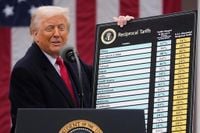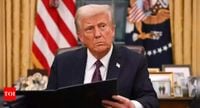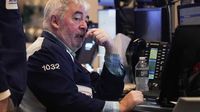On April 4, 2025, the stock market faced its worst crisis since the COVID-19 pandemic, plunging dramatically after China retaliated against President Donald Trump’s sweeping new tariffs. The S&P 500 fell by 6%, the Dow Jones Industrial Average dropped 5.5%, and the Nasdaq composite tumbled 5.8%, marking a significant downturn for investors and raising fears about the global economy.
Trump's announcement of broad reciprocal tariffs on imports, dubbed "Liberation Day," sent shockwaves through the financial markets. Following his declaration on April 2, China responded swiftly, imposing a 34% tariff on U.S. goods set to take effect on April 10. This escalation in trade tensions has left investors anxious, with many fearing a prolonged trade war that could further destabilize global markets.
Despite the alarming market responses, Trump remained defiant, asserting, "My policies will never change." He emphasized that these tariffs were necessary to protect American interests and insisted that the U.S. economy would ultimately benefit from them. The president also claimed to have had a productive conversation with Vietnam's leader, who expressed a willingness to negotiate lower tariffs in exchange for increased trade with the U.S.
The economic fallout from these tariffs has been profound. Fed Chair Jerome Powell warned that the tariffs could lead to higher inflation and slower economic growth, a sentiment echoed by many economists who are now predicting a potential recession. Powell stated, "It is becoming clear that tariff increases will be significantly larger than expected, and the same is likely to be true of the economic effects, which will include higher inflation and slower growth." This stark warning has led to increased scrutiny of the Trump administration's trade policies.
In addition to the stock market turmoil, the fallout from the tariffs has begun to affect various sectors. The auto industry, in particular, is bracing for significant impacts. Trump's new 25% tariffs on foreign-made vehicles are expected to raise car prices for consumers by over $30 billion in the first year alone. Automakers like Volkswagen and Ford are already adjusting their strategies in response to these tariffs, with some pausing shipments and others expanding employee pricing to mitigate costs.
Moreover, the tariff-induced uncertainty has led several companies to delay initial public offerings (IPOs) and mergers and acquisitions. Over the past week, at least six companies, including the ticket platform StubHub and digital payment firm Klarna, announced they would postpone their IPO preparations due to the volatile market conditions.
On the political front, the reaction to Trump’s tariffs has been mixed. Senate Democrats have been vocal in blaming the president for the market's decline, with Senator Brian Schatz of Hawaii stating, "Regular people cannot ride this out," as they witness their retirement savings evaporate. Meanwhile, some Republican senators have expressed optimism that the administration's aggressive trade stance could lead to beneficial negotiations with trading partners.
In a related development, the Navy has come under fire for removing 391 books from the U.S. Naval Academy’s library as part of a broader effort to eliminate materials promoting diversity, equity, and inclusion (DEI). This decision follows an order from Defense Secretary Pete Hegseth, further illustrating the administration's commitment to reshaping federal policies surrounding DEI initiatives.
Additionally, the Trump administration announced it would not cover high-demand obesity treatments under Medicare’s Part D prescription drug coverage, a decision that has drawn criticism from health advocates. This move aligns with a broader trend of cutting federal support for various health initiatives, raising concerns about access to essential medications.
In the wake of the recent earthquakes in Myanmar, the U.S. government pledged an additional $7 million in aid to assist victims, following a previous commitment of $2 million. This response has been criticized for being slower and smaller compared to other nations, which have mobilized larger rescue efforts.
Meanwhile, legal challenges to Trump's policies continue to mount. Sixteen states have filed a lawsuit against the administration for disrupting research funding from the National Institutes of Health (NIH), claiming that delays in grant approvals are jeopardizing critical scientific advancements. This lawsuit is among several actions taken by states to challenge the administration's decisions on health and safety funding.
The Supreme Court has also weighed in on the Trump administration's attempts to cut teacher-training funds, allowing the cuts to proceed for now, despite pushback from several Democratic-led states. This decision underscores the ongoing legal battles surrounding the administration's education policies, particularly those targeting diversity initiatives.
As the situation evolves, the uncertainty surrounding Trump's trade policies and their implications for the U.S. economy continues to grow. With rising inflation, a potential recession on the horizon, and increasing political scrutiny, the coming weeks will be crucial in determining the long-term impacts of these aggressive tariff measures on American families and businesses.
In summary, the economic landscape is shifting dramatically due to Trump's tariff policies, and the repercussions are being felt across various sectors. From the stock market's sharp decline to the challenges faced by the auto industry and the broader implications for health funding, the fallout from "Liberation Day" is a stark reminder of the complexities of global trade and its profound effects on everyday Americans.







